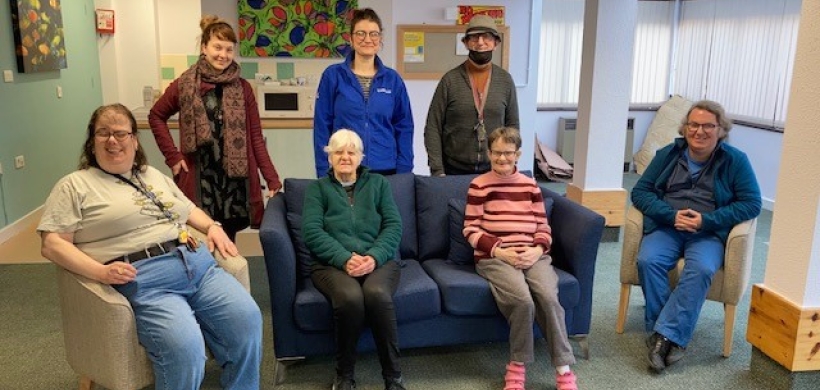Our staff have been learning sign language to improve communication with residents at a supported housing scheme in Bath.
Pennard Court has 36 flats where over seventy per cent of residents are deaf or hard of hearing.
Residents involved from the scheme feel people not having any knowledge of sign language makes things very difficult as miscommunication can happen often.
The residents, from Pennard Court, said: “It’s brilliant LiveWest are running the sessions. Learning BSL needs to happen, there are a lot of people that are deaf that need support and to feel less excluded.
“When appointments are booked in with us and people turn up, we don’t always understand why they are there, they talk at me, and I don’t understand. This can be an issue and it can go over my head.”
This week, it’s Sign Language Week from March 14 to 20 an initiative by the British Deaf Association.
This year’s theme is ‘BSL Brings us together’ so the aim is to get people to learn BSL and to find out more about the language and culture of the deaf, deafblind, and hard of hearing people.
The government has pledged its commitment to improving accessibility for deaf people across the country by backing a vital Bill which will see British Sign Language become a recognised language.
The residents said: “Communication is important and just because we can’t communicate using speech doesn’t mean we do not have things to say, there must be communication so we can discuss problems and other things.
“Just because we do not use words does not mean we cannot communicate; we may make loud noises but that is how we communicate at times. We would like people to know it’s ok to try and communicate with us even if you can’t sign, just try.”
Residents Michael Lennon, Corentin Foot, Melonie Johnston, Julie Tucker, Joanne Drew, Toni Kerley and Trudi Warren have given some advice on how best to approach them if you don’t know BSL.
They have suggested writing it down although sometimes they can struggle to understand it.
Another suggestion is if you know a little sign language you could do it slowly, having ID available also helps but getting an interpreter is the best thing if it’s an important meeting so communication is fully understood.
Being deaf brings its challenges, residents feel it is easy for misinterpretation to occur from the public but knowing a little BSL can help with this and avoid possible awkward situations.
The residents said: “If people are trying to talk to me, I feel like I need to ignore them because they don’t know I am deaf.
“It can be isolating at times when we cannot get involved in conversations.”
People not knowing any sign language can be very difficult and it makes people feel excluded from the smallest things, something which this week is trying to highlight.
The residents added: “It’s a huge problem, just the simplest of conversations can be missed like ‘hello’ or ‘how are you?’ English written letters can be a huge problem we struggle to understand them as we do not speak the language and sometimes this is not understood.”
They feel more companies should offer BSL lessons to employers because it is much more accessible and easier to learn than it ever has been.
The residents said: “McColls, our local shop has learnt to sign a bit to help us. Simple sign is helpful. We feel that this should be offered in more companies. There are ways that this can be learnt through training, the internet, and books.
“If you want to go to college and learn there are evening classes. Communication is a two-way thing, there are so many ways to learn now.”
Our Housing Officer, Charlotte Kenyon, joined a British Sign Language (BSL) course organised by the company to help her chat to residents at Pennard Court.
She would like more people to give it a go as she feels it is a useful skill to have and it is important for those with the disability to be included.
Charlotte said: “It was a really interesting course. It was lovely to be able to learn something different from our usual training sessions that we get involved with.
“It's always good to pick up a new skill and this is a skill that's going to essentially help people feel less excluded.
“The teacher was deaf as well, so she used pictures and things like that so if somebody said something we had no choice but to discuss using BSL. So, we had to pursue it and do it in practice at the same time. But then if you wanted to get something across to her, she was very good at lip reading.
Charlotte believes it should be taught in schools so that it is more inclusive to as many people as possible.
She added: “Even just a little BSL and an understanding of how they use their hands, I’ve picked up little bits just by chatting to residents. They do know I can do the alphabet so will sign it to me if I struggle.
“I've always wanted to do BSL, but there's never really been the funding in place, I don't believe. So, when this opportunity came up, I jumped at the chance. I would like to do more. But it’s about encouraging others to want to do them."
With communicating with a deaf person, there isn’t a precise way of doing it as everyone likes to be approached in different ways.
Charlotte said: “It's really tricky because some people like to be tapped. Some people you can just wave in front of their face to try and get their attention. I tend to let the residents approach me if they need anything.
“So, they've all got different preferences to how they like to communicate or be alerted. Each individual is different."
